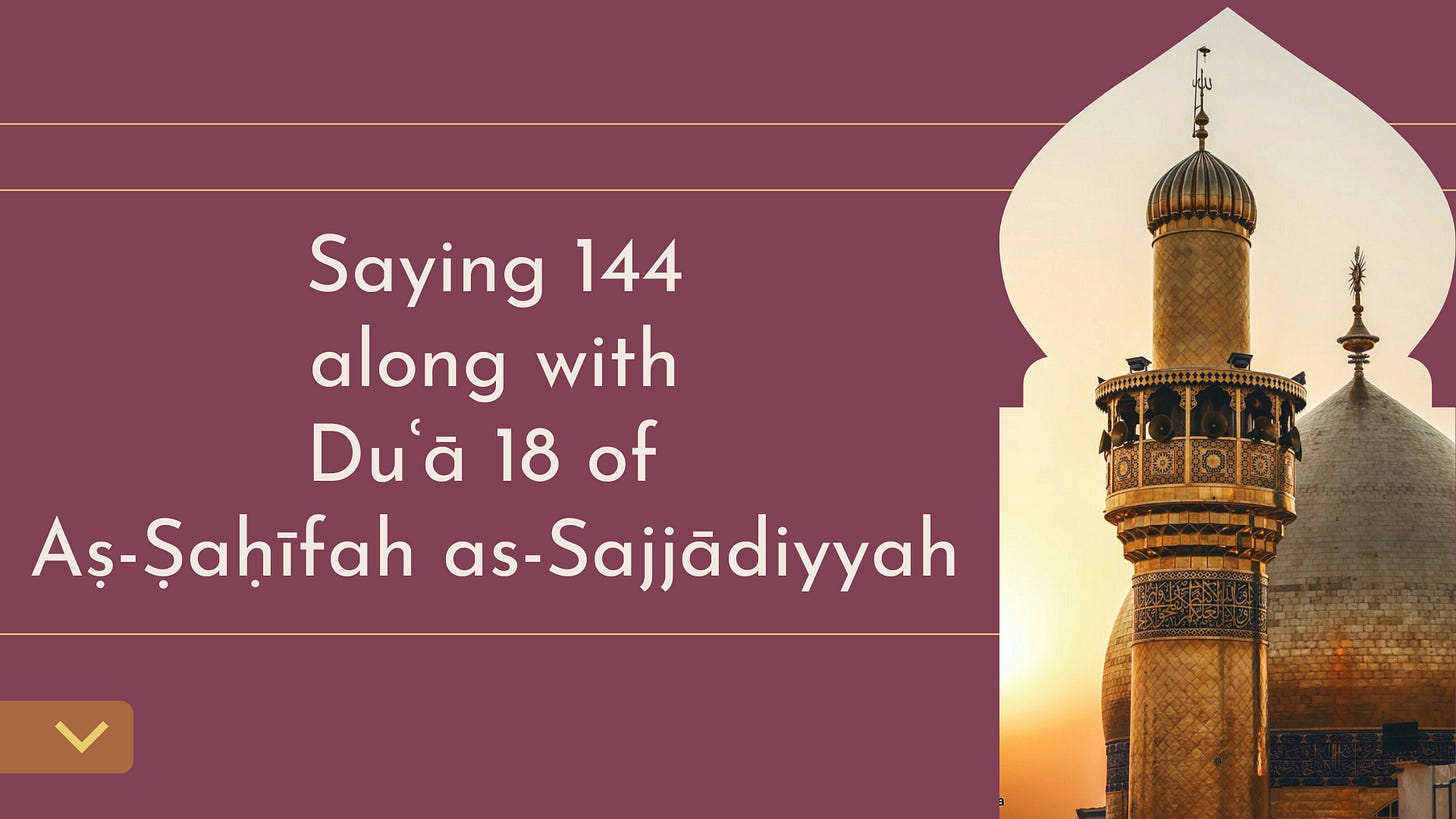Saying 144 - “Allah does not task any soul beyond its capacity…” (2:286)
﷽
In the Name of Allah, the All-Beneficent, the All-Merciful
Perhaps there isn’t a better and more descriptive title for Saying 144, than the āyah quoted wherein Allah (swt) says:
لَا يُكَلِّفُ اللَّهُ نَفْسًا إِلَّا وُسْعَهَا
Allah does not task any soul beyond its capacity.. (Sūrah al-Baqarah, āyah 286)
The wise saying of Amīr al-Muʾminīn (ʿa), that we will be discussing in this newsletter is as follows:
وقال عليه السلام : يَنْزِلُ الصَّبْرُ عَلَى قَدْرِ الْمُصِيبَةِ، وَمَنْ ضَرَبَ يَدَهُ عَلَى فَخِذِهِ عِنْدَ مُصِيبَتِهِ حَبِطَ أجْرُهُ
Amīr al-Muʾminīn, peace be upon him, said: Endurance comes according to the affliction. He who beats his hand on the thigh in his affliction ruins all his good actions. (Saying 144, Nahj al-Balāghah)
While the topic of human suffering and Divine tests is an oft-repeated discussion in the Qurʾān and the Nahj al-Balāghah, this saying has the unique feature of being like a balm to a hurting heart, and is of a therapeutic nature. Much like the āyah from Sūrah al-Baqarah, āyah 286, where Allah (swt) tells His servant that He doesn’t try him more than he can bear, similarly in this saying Imām (ʿa) says that patience/endurance comes to a person in the same measure as the affliction.
Knowing that one has the potential to bear the affliction, gives strength to the one undergoing a trial.
Let us take a closer look at this saying:
There are two parts to this saying:
Patience comes in accordance to the tragedy or trial one is facing.
One can lose out on Divine reward, if excessive impatience is shown.
There is no doubt that there will always be problems in the life of the world. This is the nature of worldly life; however Allah (swt), who created man to live in this world, has created forces in him to deal with problems, including patience and tolerance so that he can endure suffering.
Sometimes we have seen a mother who loses her dear child at a young age, in the first moments she is so impatient that she wants to give up on life. But as the hours and days pass, little by little tranquility comes to her. It is as if a force springs up from inside her and rises to fight against that great calamity and gradually curbs it. The resistance force is called patience, the heavier the calamity is, the stronger the patience is.
Crying and mourning for the death of loved ones is not forbidden in Islam, because it is natural to mourn and Islam has never fought with people's emotions. What is forbidden is impatience and expressions of ingratitude and gestures and words that are evidence of complaining about God's decrees.
وقال عليه السلام ، وقد عزّى الاَشعثَ بن قيسٍ عن ابن له: يَا أَشْعَثُ، إِنْ تَحْزَنْ عَلَى ابْنِكَ فَقَدِ اسْتَحَقَّتْ ذلِكَ مِنْكَ الرَّحِمُ، وَإِنْ تَصْبِرْ فَفِي اللهِ مِنْ كُلِّ مُصِيبَةٍ خَلَفٌ. يَا أَشْعَثُ، إِنْ صَبَرْتَ جَرَى عَلَيْكَ الْقَدَرُ وَأَنْتَ مَأْجُورٌ، وَإِنْ جَزِعْتَ جَرَى عَلَيْكَ الْقَدَرُ وَأَنْتَ مَأْزُورٌ ابْنُكَ سَرَّكَ وَهُوَ بَلاَءٌ وَفِتْنَةٌ، وَحَزَنَكَوَهُوَ ثَوَابٌ وَرَحْمَةٌ.
Amīr al-Muʾminīn, peace be upon him, said in condoling Ash'ath ibn Qays about (the death of) his son: O Ash' ath, if you grieve over your son, certainly it is the consequence of the blood relationship; but if you endure, then Allah provides recompense for every affliction. O Ash'ath, if you endure even then matters will move on as ordained by Allah but in that case you will deserve reward; while if you lose patience, matters will again move as ordained by Allah, but in this case you will be bearing the burden (of sins). O Ash'ath, your son (when he lived) gave you happiness while, at the same time, he was a trial and hardship and (when he died) he grieved you while, at the same time, he has proved a source of reward and mercy for you. (Saying 291, Nahj al-Balāghah)
Some Examples of Awliyāʾ Of Allah who showed endurance and bore the pain with patience
Examples abound in this regard, however just to name a few, to understand the discussion better, think of the patience of Lady Ummul Baneen (sa), of Prophet Ayyūb (ʿa) and of Shahīd ath-Thānī1 and Banu Amīn2 when they lost quite a few of their children in infancy.
The unique feature that all Godly people have is best understood by these lines of Imām Ḥusayn (ʿa), as he stood on the plains of Karbalāʾ holding on to his 6 month old martyred son, he said something that makes us understand the source of this unshakeable patience:
Imām Ḥusayn (ʿa) took his hand under ʿAbdullāh's (ʿAlī al-Aṣghar’s) neck and, when his hand filled with blood, threw it all up to the sky. Then, Imām Ḥusayn (ʿa) said, "what makes all these hardships easy for me is the fact that all of this has happened in the presence of God."3 (هوّن عليّ ما نزل بي إنه بعين الله)
Similarly, Rasūlullāh (ṣ) mourned the death of his little son, Ibrāhīm, but said these lines which give us a glimpse into the kind of thoughts and beliefs we should aspire towards:
The Prophet (ṣ) said at the death of his little son:
تَدْمَعُ الْعَیْنُ وَیَحْزَنُ الْقَلْبُ وَلا نَقُولُ ما یُسْخَطُ الرَّبُ
“The eyes cry and the heart becomes sad, but I do not say anything to invoke God's wrath.”
The absolute trust and submission to Allah (swt), makes a person stronger than his expectations. Furthermore, while we can and should mourn our loved ones, it should not be that we complain against Allah, or show disrespect towards Him by asking questions such as “Why me?” or “Why is everyone around me not suffering, and only me?” etc.
Glimpses into Dua 18 of Aṣ-Ṣaḥīfah as-Sajjādiyyah to gain a better understanding of Saying 144, Nahj Al Balaghah:
Imām ʿAlī as-Sajjād Zayn al-ʿĀbidīn (ʿa) in Duʿāʾ 18, of Aṣ-Ṣaḥīfah as-Sajjādiyyah, entitled ‘When perils were repelled or requests quickly granted’, starts the duʿā with the praise (ḥamd) of Allah (swt) and one of the things he praises Allah (swt) for is:
وَبِمَا صَرَفْتَ عَنِّي مِنْ بَلائِكَ،
.and for Your trial which You hast turned away from me!
A deeper look at what Imām (ʿa) is praising Allah (swt) for shows us that we are unaware of the problems that may have come our way, and have been averted. This is an important point.
Consider this example:
When Khidr made a hole in the boat of those poor fishermen, most probably their reaction must have been of anger towards the perpetrator, not knowing that through him, Allah (swt) had removed a big problem from their way.
So many times in life what might look like a big trial, might actually be something that is avoiding a bigger tragedy, but we will never know, hence the ‘ḥamd’ for Allah (swt), every step of the way!
فَلاَ تَجْعَـلْ حَظِّي مِنْ رَحْمَتِكَ مَا عَجَّلْتَ لِي مِنْ عَافِيَتِكَ
But make not my share of Your mercy the well-being which You hast quickly granted to me,
فَأكُونَ قَدْ شَقِيتُ بِمَا أَحْبَبْتُ وَسَعِدَ غَيْرِي بِمَا كَرِهْتُ،
lest I become wretched through what I have loved and someone else gain felicity through what I have disliked!
It shouldn’t be that Allah (swt)’s quickness in giving, is just for this world, only our now (which is so short lived). What if due to this short-lived comfort, we lose out on eternal felicity?
What if what we disliked in the worldly life (like poverty, illness etc), was given to others by Allah (swt) and they actually gained felicity due to it!
Imām Sajjād (ʿa) with his God-given vision is explaining to us that bearing trouble in this world is better than in the next world.
Therefore, if by getting short-lived comfort in this transient life, we might be missing it in our eternal life, then it is really not worth it.
The Qurʾān in Sūrah al-ʿAnkabūt, āyah 64, points to this reality :
وَمَا هَٰذِهِ الْحَيَاةُ الدُّنْيَا إِلَّا لَهْوٌ وَلَعِبٌ ۚ وَإِنَّ الدَّارَ الْآخِرَةَ لَهِيَ الْحَيَوَانُ ۚ لَوْ كَانُوا يَعْلَمُونَ
“The life of this world is nothing but diversion and play, but the abode of the Hereafter is indeed Life (itself), had they known!”
Imām Sajjād (ʿa) further says in this blessed duʾā:
وَإنْ يَكُنْ مَا ظَلِلْتُ فِيهِ أَوْ بِتُّ فِيهِ مِنْ هَذِهِ الْعَافِيَةِ
If this well-being in which I pass the day or night,
بَيْنَ يَدَيْ بَلاء لاَ يَنْقَطِعُ، وَوِزْر لاَ يَرْتَفِعُ
should precede a trial that does not cease and a burden that does not pass away,
فَقَدِّمْ لِي مَا أَخَّرْتَ وَأَخِّرْ عَنّي مَا قَدَّمْتَ
then set before me what You hadst set behind and set behind me what You hadst set before!
This duʾā is not easy to ask for. It is totally mind-boggling what the Imām (ʿa) is teaching us, and once these lessons settle in our heart, the love we have for this transient life, lessens.
If the well-being that I am enjoying right now, in this short-lived life, makes me forget Allah (swt), which in turn will lead to troubles that won’t end (because the hereafter is eternal), then what I am asking for is an exchange… I am saying I prefer hardship in this dunyā and ease in the ākhirah!
We conclude by humbly praying to Allah (swt) to give us the patience to bear any trial that might affect us, to react correctly, and to ALWAYS remember that the life of this world is transient and passing, it is the life of the Hereafter that is eternal and towards which I should expend all my efforts. Āmīn.
This is the first StudyNB article for the year 2023, we hope you have spread the word for more people to join and receive their dose of weekly inspiration from Nahj al-Balāghah. You can sign up below:
Have a great week.
https://en.wikishia.net/view/Musakkin_al-fu%27ad_(book)
https://en.wikishia.net/view/Sayyida_Nusrat_Amin
Ibn Ṭāwūs, al-Luhūf, p. 117.


